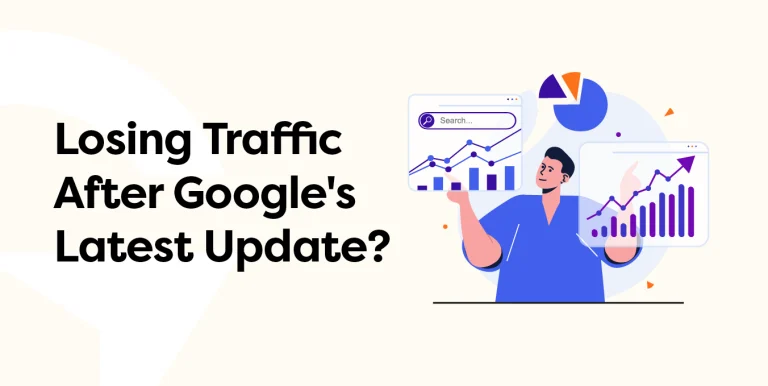Google Traffic Down by 70%: The New Normal in AI-Dominated Search
Google traffic down by 70% is no longer a rare event—it’s becoming the new normal.
If you’ve noticed a sudden drop in organic traffic, even though your rankings haven’t changed much, you’re not alone. The game has changed—and it’s being driven by AI-powered answers and evolving user behavior.
Let’s break down why your SEO traffic is dropping, and how to reposition your brand for visibility in an AI-dominated search landscape.
Why Your SEO Traffic Is Dropping: Google Is Answering, Not Referring
In the past, Google connected users to websites. Today, it’s doing more than that—it’s replacing those websites with AI-generated answers.
Google’s new AI Overviews generate full summaries based on content pulled from multiple sources. These answers appear right at the top of the page, above traditional search results. In many cases, users no longer need to scroll or click.
That’s why even top-ranking pages are experiencing up to 70% drops in traffic. Searchers are still active—but they’re getting what they need without visiting your site.
A Deeper Look at Why Your SEO Traffic Is Dropping
AI Overviews Are Taking Over the First Page
When a user searches for something, they often see a large AI box offering a summarized answer from various websites. These overviews are fast, convenient, and—most importantly—require zero clicks. If your site was once the go-to answer, it may now be one of many hidden behind a faceless summary.
This shift has removed the need for users to explore deeper into search results. The “zero-click search” is becoming standard.
Users Are Searching in New Places
Traditional search isn’t the only discovery method anymore. Platforms like TikTok, YouTube, Reddit, and ChatGPT are rising fast as go-to sources for information.
People now:
- Watch a TikTok to research a product
- Ask ChatGPT for recommendations
- Scan Reddit threads for real-world reviews
- Search YouTube for tutorials instead of reading articles
If your content isn’t present where people are now searching, your visibility is shrinking—regardless of your Google rank.
Outdated SEO Content Is Getting Ignored
Even if you’re still ranking, AI favors clean, clear, and highly structured content. Pages stuffed with keywords or lacking originality are getting passed over—by both users and AI. If your site hasn’t been updated with these standards in mind, it’s likely falling behind.
What to Do When Google Traffic Is Down by 70%
This isn’t the time to abandon SEO—it’s time to adapt it. Here’s how to reclaim visibility and build resilience:
Refocus on AI-Friendly Content
Structure matters. Use subheadings, clear answers, and well-organized content. Google’s AI pulls from pages that are easy to understand and confidently authoritative.
Rather than obsessing over keyword frequency, focus on answering intent-based questions and making your content easy to extract from.
Expand Beyond Google
Your audience is exploring multiple platforms before making decisions. Investing in content for YouTube, TikTok, LinkedIn, or even Telegram communities puts you back in front of real users.
This doesn’t mean abandoning your blog—but it does mean repackaging key insights as short videos, visual posts, or even interactive discussions.
Make Brand Recognition Your New SEO
When AI delivers an answer, users may not see where it came from. That’s why brand visibility matters more than ever. Be present across channels. Be consistent with tone and visuals. Most importantly, provide value that keeps your name top of mind—even if your URL isn’t clicked.
Final Thoughts: Google Traffic Down by 70% Isn’t a Death Sentence—It’s a Signal
If you’ve been wondering why your SEO traffic is dropping, it’s time to look beyond the usual suspects.
The way people consume content is evolving—and if you’re relying solely on traditional Google search, you’re missing where attention is really going. Fortunately, that attention isn’t gone—it’s just been redistributed.
By optimizing for AI visibility, creating multi-platform content, and building brand trust, you can do more than recover—you can thrive.



